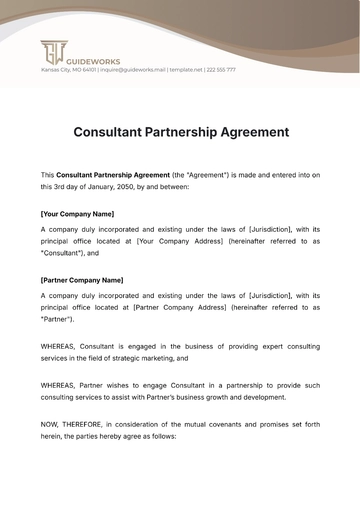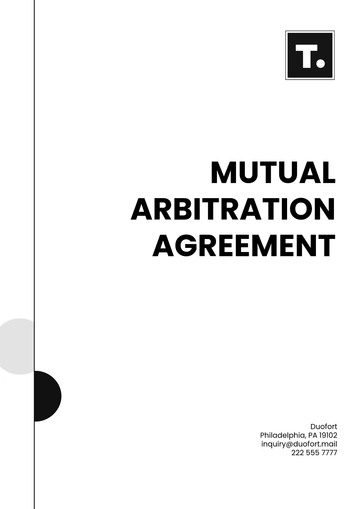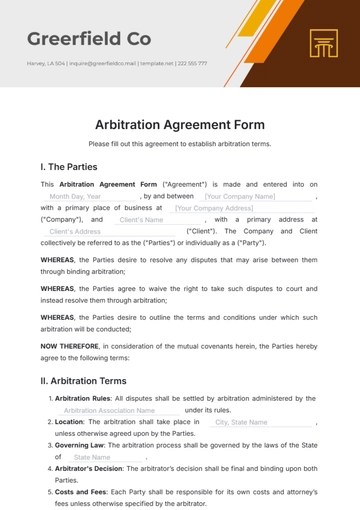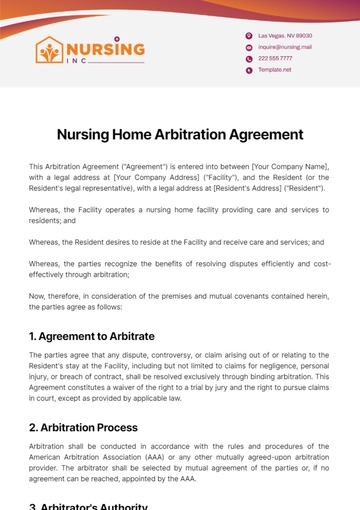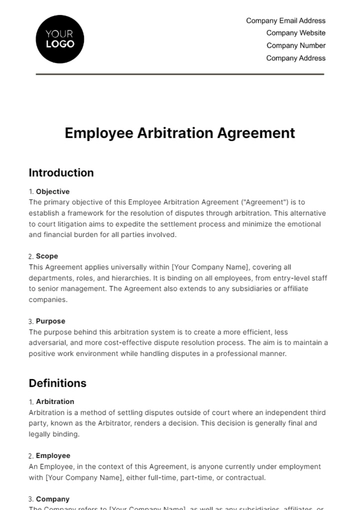Free Mediation Agreement

This agreement is entered into by and between [Name of Party 1] ("Party 1") and [Name of Party 2] ("Party 2"), collectively referred to as the "Parties," and facilitated by [Your Name] ("Mediator"), on [Date].
Section 1. Purpose of Mediation
The parties have agreed to mediate a dispute concerning a contract disagreement over widget delivery schedules and quality standards. They recognize mediation as a voluntary and confidential process aimed at achieving a mutually acceptable resolution. Mediation offers a collaborative and confidential avenue for resolving disputes. Its voluntary nature highlights the parties' commitment to working together towards a satisfactory solution. Confidentiality in mediation ensures private discussions, fostering open communication and constructive problem-solving toward a mutually beneficial outcome.
Section 2. Mediation Process
The parties agree to participate sincerely in mediation sessions led by the Mediator. This commitment reflects their willingness to engage in the process with honesty and integrity. They also pledge to cooperate with the Mediator and each other during the sessions. This collaboration involves actively exploring potential solutions to the dispute in a constructive manner. Their joint commitment to cooperation and exploration underscores their shared determination to reach a fair and satisfactory resolution through the mediation process.
Section 3. Confidentiality
All communications in the mediation process, including discussions, documents, and proposals, are confidential and cannot be disclosed to third parties unless agreed upon by all parties or mandated by law. This confidentiality clause ensures the integrity of the mediation process, prohibiting the sharing of information outside mediation without consent or legal obligation. Upholding confidentiality fosters trust and open communication, crucial for resolving disputes effectively. This commitment underscores its significance in achieving successful mediation outcomes.
Section 4. Voluntary Participation
Participation in mediation is voluntary, allowing the parties to withdraw at any point. Nonetheless, they commit to sincerely engaging in the process until a resolution is achieved or the Mediator deems further efforts unproductive. While voluntary, the parties agree to invest genuine effort in the mediation process, aiming for a resolution that satisfies all involved parties or until the Mediator advises otherwise. This agreement emphasizes the parties' commitment to the mediation process, balancing voluntariness with a good-faith effort toward resolution, guided by the Mediator's assessment of progress.
Section 5. Agreement Binding
In mediation, agreements must be written and signed by all parties to ensure clarity and consensus. This written documentation solidifies the terms agreed upon, leaving no room for misunderstanding. Once signed, the agreement becomes legally binding, obligating all parties to adhere to its terms. Failure to comply allows parties to seek enforcement through legal means. Mediated agreements are enforceable in courts, providing a formal mechanism for resolution and legal recourse if disputes arise.
Section 6. Costs
Unless otherwise agreed upon by the involved parties, each party is responsible for bearing the costs associated with the mediation process. These costs may encompass expenses such as fees incurred from hiring legal professionals or attorneys, among others. This provision highlights the default arrangement regarding the allocation of costs in the mediation process, emphasizing the individual responsibility of each party for their financial obligations. While not exhaustive, the mentioned costs encompass various expenses that parties may encounter throughout the mediation process, reinforcing their accountability for managing their respective financial commitments.
Section 7. Governing Law
The agreement will be governed by the laws of the jurisdiction in which it applies, shaping all legal aspects within its scope accordingly. This clause establishes the legal framework, ensuring adherence to the jurisdiction's laws. It provides clarity on how legal matters will be addressed within the applicable legal framework.
Section 8. Entire Agreement
This agreement represents the comprehensive understanding between the Parties regarding the subject matter at hand, surpassing all prior agreements and understandings, whether verbal or written. By consolidating all pertinent terms and conditions within this document, the agreement serves as the primary reference point for the Parties, ensuring clarity and consistency in their interactions and obligations. Through its encompassing nature, this agreement eliminates the need to reconcile or refer to previous agreements, streamlining the Parties' dealings and fostering an unambiguous foundation for their relationship.
Section 9. Modification
Any alterations or modifications to this agreement necessitate documentation in written format. Subsequently, all involved parties must provide their signatures as an acknowledgment of these changes. This requirement ensures transparency and accountability in any amendments made to the agreement, emphasizing the importance of formalizing modifications through written documentation. By mandating signatures from all parties, this process confirms their understanding and acceptance of the revised terms, thereby maintaining the integrity and enforceability of the agreement.
Section 10. Severability
If any provision within this agreement is found to be invalid or unenforceable, the remaining provisions will remain valid and fully enforceable, retaining their full force and effect. This clause ensures that the invalidity or unenforceability of one provision does not affect the validity or enforceability of the rest of the agreement. By preserving the validity and enforceability of the remaining provisions, this clause maintains the integrity and effectiveness of the agreement as a whole, allowing it to continue governing the relationship between the parties.
Section 11. Execution
This agreement may be executed in multiple counterparts, each considered an original document, and collectively they form a unified agreement. By allowing execution in counterparts, this provision facilitates convenience in signing and exchanging documents, without requiring all parties to sign a single physical document. This approach ensures that the agreement is legally binding and fully effective, regardless of the number of separate counterparts signed by the parties involved.
IN WITNESS WHEREOF, the Parties have executed this agreement on the date first above written.

[Your Name] (Mediator)
[Date Signed]

[Name of Party 1]
[Date Signed]

[Name of Party 2]
[Date Signed]
- 100% Customizable, free editor
- Access 1 Million+ Templates, photo’s & graphics
- Download or share as a template
- Click and replace photos, graphics, text, backgrounds
- Resize, crop, AI write & more
- Access advanced editor
Resolve disputes amicably with our Mediation Agreement Template, exclusively available on Template.net. This editable and customizable document simplifies the creation of mediation contracts, ensuring clarity and fairness in the process. With compatibility in our Ai Editor Tool, modifications are effortless to suit specific needs. Streamline mediation agreements with confidence, fostering constructive resolutions. Simplify dispute resolution with peace of mind.
You may also like
- Lease Agreement
- Non Compete Agreement
- Rental Agreement
- Prenuptial Agreement
- Non Disclosure Agreement
- Operating Agreement
- Hold Harmless Agreement
- LLC Operating Agreement
- Arbitration Agreement
- Purchase Agreement
- Residential Lease Agreement
- Executive Agreement
- Confidentiality Agreement
- Contractor Agreement
- Partnership Agreement
- Postnuptial Agreement
- Collective Bargaining Agreement
- Loan Agreement
- Roommate Agreement
- Commercial Lease Agreement
- Separation Agreement
- Cohabitation Agreement
- Room Rental Agreement
- Child Custody Agreement
- Employee Agreement
- License Agreements
- Settlement Agreement
- Joint Venture Agreement
- Indemnity Agreement
- Subordination Agreement
- Sales Agreement
- Agreements Between Two Parties
- Business Agreement
- Real Estate Agreement
- HR Agreement
- Service Agreement
- Property Agreement
- Agreement Letter
- Restaurant Agreement
- Construction Agreement
- Finance Agreement
- Marketing Agreement
- Payment Agreement
- Investment Agreement
- Management Agreement
- Nonprofit Agreement
- Software Agreement
- Startup Agreement
- Agency Agreement
- Copyright Agreement
- Collaboration Agreement
- Reseller Agreement
- Car Rental Agreement
- Cleaning Services Agreement
- Consultant Agreement
- Deed Agreement
- Car Agreement
- Equipment Agreement
- Shares Agreement
- Data Sharing Agreement
- Advertising Agreement
- School Agreement
- Franchise Agreement
- Event Agreement
- Travel Agency Agreement
- Vehicle Agreement
- Board Resolution Agreement
- Land Agreement
- Binding Agreement
- Tenancy Agreement
- Exclusive Agreement
- Development Agreement
- Assignment Agreement
- Design Agreement
- Equity Agreement
- Mortgage Agreement
- Purchase and Sale Agreement
- Shareholder Agreement
- Vendor Agreement
- Royalty Agreement
- Vehicle Lease Agreement
- Hotel Agreement
- Tenant Agreement
- Artist Agreement
- Commission Agreement
- Consignment Agreement
- Debt Agreement
- Recruitment Agreement
- Training Agreement
- Transfer Agreement
- Apprenticeship Agreement
- IT and Software Agreement
- Referral Agreement
- Resolution Agreement
- Waiver Agreement
- Consent Agreement
- Partner Agreement
- Social Media Agreement
- Customer Agreement
- Credit Agreement
- Supply Agreement
- Agent Agreement
- Brand Agreement
- Law Firm Agreement
- Maintenance Agreement
- Mutual Agreement
- Retail Agreement
- Deposit Agreement
- Land Purchase Agreement
- Nursing Home Agreement
- Supplier Agreement
- Buy Sell Agreement
- Child Support Agreement
- Landlord Agreement
- Payment Plan Agreement
- Release Agreement
- Research Agreement
- Sponsorship Agreement
- Buyout Agreement
- Equipment Rental Agreement
- Farm Agreement
- Manufacturing Agreement
- Strategic Agreement
- Termination of Lease Agreement
- Compliance Agreement
- Family Agreement
- Interior Design Agreement
- Ownership Agreement
- Residential Lease Agreement
- Retainer Agreement
- Trade Agreement
- University Agreement
- Broker Agreement
- Dissolution Agreement
- Funding Agreement
- Hosting Agreement
- Investor Agreement
- Memorandum of Agreement
- Advisory Agreement
- Affiliate Agreement
- Freelancer Agreement
- Grant Agreement
- Master Service Agreement
- Parking Agreement
- Subscription Agreement
- Trust Agreement
- Cancellation Agreement
- Horse Agreement
- Influencer Agreement
- Membership Agreement
- Vacation Rental Agreement
- Wholesale Agreement
- Author Agreement
- Distributor Agreement
- Exchange Agreement
- Food Agreement
- Guarantee Agreement
- Installment Agreement
- Internship Agreement
- Music Agreement
- Severance Agreement
- Software Development Agreement
- Storage Agreement
- Facility Agreement
- Intercompany Agreement
- Lending Agreement
- Lodger Agreement
- Outsourcing Services Agreement
- Usage Agreement
- Assurance Agreement
- Photography Agreement
- Profit Sharing Agreement
- Relationship Agreement
- Rent To Own Agreement
- Repayment Agreement
- Volunteer Agreement
- Co Parenting Agreement
- HVAC Agreement
- Lawn Care Agreement
- SAAS Agreement
- Work from Home Agreement
- Coaching Agreement
- Protection Agreement
- Security Agreement
- Repair Agreement
- Agreements License
